

Ricoeur, Lectures on Ideology and Utopia. RicoeurandHermeneutics. Essays-on-ideology_-althusser. Ideology and Ideological State Apparatuses by Louis Althusser 1969-70. Louis Althusser 1970 “Lenin and Philosophy” and Other Essays First published: in La Pensée, 1970;Translated: from the French by Ben Brewster;Source: Lenin and Philosophy and Other Essays, Monthly Review Press 1971;Transcribed: by Andy Blunden.
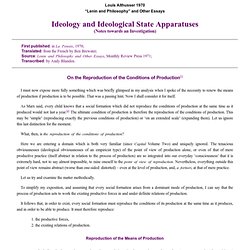
On the Reproduction of the Conditions of Production[1] I must now expose more fully something which was briefly glimpsed in my analysis when I spoke of the necessity to renew the means of production if production is to be possible. That was a passing hint. Now I shall consider it for itself. As Marx said, every child knows that a social formation which did not reproduce the conditions of production at the same time as it produced would not last a year.[2] The ultimate condition of production is therefore the reproduction of the conditions of production. Althusser. 2004-07. 07Althusser,IdeologyandIdeologicalStateApparatuses. Synopsis of "Ideology and ISA's" Post-structuralism and the politics of representation - Ideology - film, nationality, cinema. Reacting against existential and Hegelian Marxism and the ultra-left political groups influenced by it, Louis Althusser (1918–1990) and a school of structural Marxists developed more "scientific forms" of Marxism and ideology while maintaining their commitment to revolutionary politics.
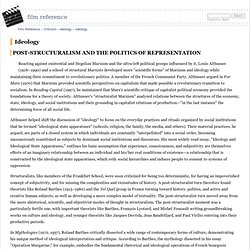
A member of the French Communist Party, Althusser argued in For Marx (1970) that Marxism provided scientific perspectives on capitalism that made possible a revolutionary transition to socialism. In Reading Capital (1997), he maintained that Marx's scientific critique of capitalist political economy provided the foundations for a theory of society. Ideology / Media concepts / Teaching media studies / Home - Media Studies Private Community. Ideology is an important concept for media studies students to understand as it underpins many of the other aspects of media studies (such as representation).

What is an ideology? An ideology is a world view, a system of values, attitudes and beliefs which an individual, group or society holds to be true or important; these are shared by a culture or society about how that society should function. Dominant ideologiesIdeologies that are told to us repeatedly by important social institutions such as the church, the law, education, government, and the media are called dominant ideologies. Dominant ideologies are ideologies or beliefs that we live by in our day-to-day lives and often do not question – they have become 'natural, common sense' things to do. Althusser-hall. Par Karlu Manheimu. Karl Mannheim's Ideology and Utopia - Turner - 2006 - Political Studies.
Ideology and sociology: Reflections on Karl Mannheim's Ideology and Utopia - Journal of Political Ideologies - Volume 11, Issue 2. Ideology was a favourite and much-discussed concept for many sociologists in the decades of the 1960s and 1970s.

Undoubtedly this was mainly connected to Marxism, but Karl Mannheim—as a critic of Marx—had his part to play in this too. Ideology, and with it Mannheim's work, fell into disfavour with the retreat from Marxism in the 1980s and 1990s. But one could argue that much of what Mannheim discussed under the heading ‘ideology’ can now be found under other labels in sociology, such as ‘social constructionism’ and ‘discourse analysis’. Ideoloģija un utopija. Introduction to Karl Marx, Module on Ideology. From Spectres of Marx, by Jacques Derrida. Jacques Derrida 1994 Source: Specters of Marx, the state of the debt, the Work of Mourning, & the New International, translated by Peggy Kamuf, Routledge 1994 What is ideology?
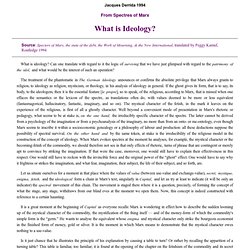
Can one translate with regard to it the logic of surviving that we have just glimpsed with regard to the patrimony of the idol, and what would be the interest of such an operation? Ideology: A marxist perspective. G_ideology. John Lye - īss pārskats par ideoloģijas jēdzienu. Copyright 1997 by John Lye.
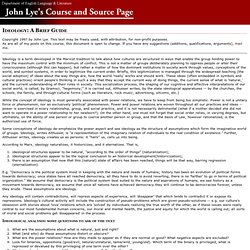
This text may be freely used, with attribution, for non-profit purposes. As are all of my posts on this course, this document is open to change. If you have any suggestions (additions, qualifications, arguments), mail me. Ideology is a term developed in the Marxist tradition to talk about how cultures are structured in ways that enable the group holding power to have the maximum control with the minimum of conflict. Articulating principle of class ideological discourse. From the blog Lenin's Tomb Quilting point posted by lenin "The class character of an ideological discourse is revealed in what we could call its specific articulating principle.
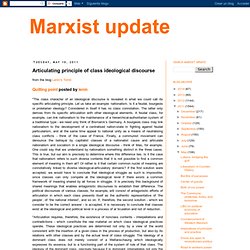
Let us take an example: nationalism. Marx’s Critique of Hegel’s Philosophy of Right, 1843-4. Camera Obscura, Of Ideology. Marx’s Critique of Hegel’s Philosophy of Right, 1843-4. The German Ideology. False consciousness. Author: Daniel Little University of Michigan-Dearborn “False consciousness” is a concept derived from Marxist theory of social class.
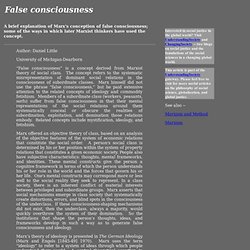
The concept refers to the systematic misrepresentation of dominant social relations in the consciousness of subordinate classes. Marx himself did not use the phrase “false consciousness,” but he paid extensive attention to the related concepts of ideology and commodity fetishism. Lecture 24: The Age of Ideologies (2): Reflections on Karl Marx. History does nothing, it "possesses no immense wealth," it "wages no battles.
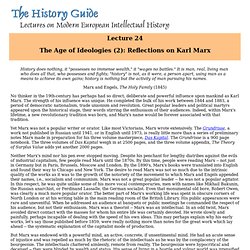
" It is man, real, living man who does all that, who possesses and fights; "history" is not, as it were, a person apart, using man as a means to achieve its own gains; history is nothing but the activity of man pursuing his names. Marx and Engels, The Holy Family (1845) No thinker in the 19th-century has perhaps had so direct, deliberate and powerful influence upon mankind as Karl Marx. The strength of his influence was unique. What is Ideology? - mobile wiseGEEK. Catapult43 makes a well thought statement.

This is true. I am ashamed to say i eat out more than once and a while. Eating out adds up. The media has deteriorated over time. Now that news stations are so competitive, they just care about how good their ratings are. The media will often cover stories on Micheal Jackson very extensively, while in fact, there may have possibly been a more important story in the nation. Valoda un ideoloģija. Cynicism as a Form of Ideology. The most elementary definition of ideology is probably the well-known phrase from Marx's Capital: "Sie wissen das nicht, aber sie tun es" ("they do not know it, but they are doing it").
The very concept of ideology implies a kind of basic, constitutive naïveté: the misrecognition of its own presuppositions, of its own effective conditions, a distance, a divergence between so-called social reality and our distorted representation, our false consciousness of it. That is why such a 'naive consciousness' can be submitted to a critical-ideological procedure. The aim of this procedure is to lead the naïve ideological consciousness to a point at which it can recognize its own effective conditions, the social reality that it is distorting, and through this very act dissolve itself. Current Trends in Islamist Ideology. Diversity Defined in Part by Ideology. By Rick Nauert PhD Senior News Editor Reviewed by John M. Grohol, Psy.D. on March 2, 2012 Cultural sensitivity and acknowledging diversity are common goals for many institutions.
But what exactly is diversity? It depends in part on one’s ideological beliefs about the status quo and inequality. Traditionally, “diversity” meant inclusiveness toward historically disadvantaged groups, said Miguel Unzueta, Ph.D., the study’s lead author. Now, however, the term is commonly used to refer to people who are different in any way (even personality traits and food preferences) — and that, Unzueta argues, may be making the concept useless. Unzueta said he saw this play out firsthand at the universities he was part of and the organizations he studied. The Californian Ideology. By Richard Barbrook and Andy Cameron (August 1995) See also Louis Rossetto's Rebuttal of the Californian Ideology Not to lie about the future is impossible and one can lie about it at will - Naum Gabo [1] As the Dam Bursts...
Antonio Gramsci, schooling and education. Contents: introduction · ideological hegemony · organic intellectuals · gramsci on schooling and education · references · how to cite this article Antonio Gramsci (1891 – 1937) was a leading Italian Marxist. He was an intellectual, a journalist and a major theorist who spent his last eleven years in Mussolini’s prisons. During this time, he completed 32 notebooks containing almost 3,000 pages. These notebooks were smuggled out from his prison and published in Italian after the war but did not find an English-language publisher until the 1970s.
The central and guiding theme of the Notebooks was the development of a new Marxist theory applicable to the conditions of advanced capitalism. He was born in a little town on the island of Sardinia in 1891, one of seven children. The organised workers of Turin had a very combative history. Gramsci had already become a socialist through reading pamphlets sent home to Sardinia from the mainland by an older brother. Ideological Hegemony Links. Hegemony. Hegemony “Hegemony” was most likely derived from the Greek egemonia, whose root is egemon, meaning “leader, ruler, often in the sense of a state other than his own” (Williams, Keywords 144).
Since the 19th century “hegemony” commonly has been used to indicate “political predominance, usually of one state over another” (Williams, Keywords 144). According to Perry Anderson’s “The Antinomies of Antonio Gramsci,” “hegemony” acquired a specifically Marxist character in its use (as “gegemoniya“) by Russian Social-Democrats, from the late 1890s through the Bolshevik Revolution in 1917 (15). Portrait of Antonio Gramsci around 30 in the early 20s/ public domain. Ideoloģija un mācību programmas. Ideoloģija un mācību programmas. Studijas un nākotne. Law and Ideology.